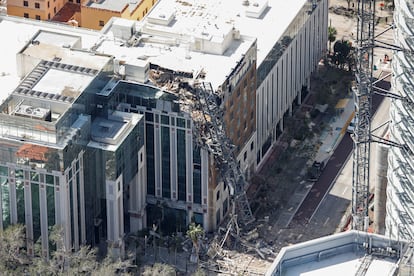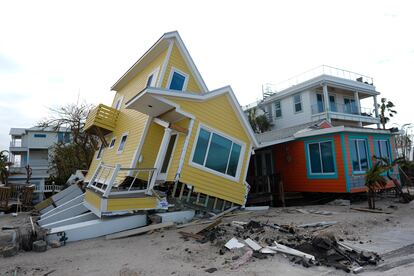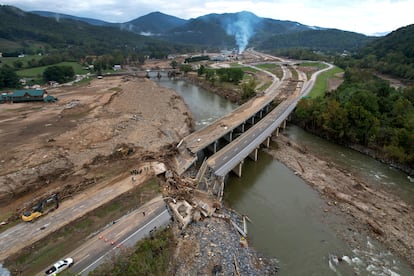Milton, the Democrats’ secret weapon to win the election, and other campaign hoaxes
The misinformation that started to spread after the damage from Hurricane Helene and which continues unabated opens up a new front in the partisan battle with less than a month to go before Election Day


The Trumpist ideologue Steve Bannon, currently in jail for contempt of Congress, has one of his favorite quotes framed in his office. It says: “There are no conspiracies, but there are also no coincidences.” It is from this perverse logic that the fertile and toxic imagination of certain sectors of the far-right in the United States has ended up spreading the idea that Milton was not only one of the largest hurricanes in history to form in the Gulf of Mexico but, together with another previous storm, Helene, which left at least 225 dead in the southeast of the country, it was in fact a deliberate move by Kamala Harris to win the November election.
This and other hoaxes — such as that Democrats control the weather or that it’s all a plot to clear land in North Carolina (where Hurricane Helene hit the hardest) and thus give a boost to lithium mining — have emerged these days in dark corners of the internet, their traditional habitat. The difference between this October and those of other election years, which, as the saying goes, always produce an “October surprise” — is that the candidate of one of the two parties, the Republican Donald Trump, has not hesitated to spread some of these falsehoods through the sensational megaphone of his social media accounts and his rallies. Nor did Elon Musk, the wealthiest person in the world, want to miss out on the opportunity to contribute to this ceremony of confusion.
Given such amplifying power, one might wonder whether these natural disasters will have any effect on the vote on November 5, or whether, on the contrary, this campaign is officially immune to any outside influence following assassination attempts, wars, and the withdrawal of one of the two original candidates.

The handling of Hurricane Sandy, which hit New Jersey and New York in October 2012, just a week before Barack Obama was re-elected, is still fresh in everyone’s minds. Hurricane season and election season always coincide in the United States, but that occasion was special: polls indicated that 15% of voters cited the Democrat’s effective response to the hurricane as the factor that most contributed to their votes. It also helped that his rival, Mitt Romney, had said in a debate during the primaries that, if he were elected president, he would support the closure of the federal agency that manages emergencies (FEMA), because he considered it better to leave fund management in the hands of the states. By the time he tried to walk back these statements, it was too late.
FEMA has also lately been in the crosshairs of Trump and his supporters, who have pledged to dismantle the federal agency in order to seduce a growing number of citizens who are disillusioned with the system. The Republican candidate has accused President Joe Biden of diverting a billion dollars from the agency’s budget to allocate it to support programs for “illegal immigrants.” He has also said that FEMA is only giving $750 to hurricane victims (an amount that is actually just the first payment to cover basic needs, before receiving benefits of up to $42,000) or that the money is not reaching Republican areas in North Carolina, one of the seven decisive states, to purposely hinder the logistics of their vote on election day.

In Biden’s three public appearances since Wednesday, when Milton approached the western coast of Florida with a devastating power that, fortunately, was somewhat reduced when it made landfall, the American president referred to the “reckless, irresponsible and relentless promotion of disinformation and outright lies [...] It’s harmful to those who need help the most.”
Deanne Criswell, the administrator of FEMA — a job once viewed as far removed from the front lines of partisan fire — said on a call with reporters Tuesday that she had never seen so much misinformation being spread before this. “It’s absolutely the worst that I have ever seen,” she said. The Red Cross, meanwhile, issued a statement last week warning of the danger of misinformation in scenarios like these.
Biden’s first intervention was a live broadcast provided by the main cable news networks of the crisis cabinet meeting held on Wednesday to prepare for Milton’s arrival. The unusual staging, in which Harris also participated, suggested a double strategy: to dispel the doubts expressed by the Republican Party about the administration’s alleged negligence in handling the tragedy, and to amplify the messages of caution to Florida’s residents.
The Great Evacuation
The second goal appeared to be achieved Thursday morning, as the Sunshine State awoke after the storm and local and state officials — led by Republican Governor Ron DeSantis — cheered that the warning calls had worked. Biden later said more than 80,000 people had left their homes to seek shelter from Milton, one of the largest evacuations in state history.
This is not the first time that DeSantis has distanced himself from his own party when it comes to managing a catastrophe like Milton or Helene. During Hurricane Ian, a monster of wind and water that swept away entire neighborhoods and killed 125 people in 2022, DeSantis inspected the hardest-hit area with Biden, on the coast of Fort Myers, a month before another election in which the governor swept the polls. On Wednesday, DeSantis confirmed that he had spoken several times with the president, while embroiled in a controversy for not having answered a call from Harris to discuss the issue. “She has no role in this,” he said.
Sign up for our weekly newsletter to get more English-language news coverage from EL PAÍS USA Edition
Tu suscripción se está usando en otro dispositivo
¿Quieres añadir otro usuario a tu suscripción?
Si continúas leyendo en este dispositivo, no se podrá leer en el otro.
FlechaTu suscripción se está usando en otro dispositivo y solo puedes acceder a EL PAÍS desde un dispositivo a la vez.
Si quieres compartir tu cuenta, cambia tu suscripción a la modalidad Premium, así podrás añadir otro usuario. Cada uno accederá con su propia cuenta de email, lo que os permitirá personalizar vuestra experiencia en EL PAÍS.
¿Tienes una suscripción de empresa? Accede aquí para contratar más cuentas.
En el caso de no saber quién está usando tu cuenta, te recomendamos cambiar tu contraseña aquí.
Si decides continuar compartiendo tu cuenta, este mensaje se mostrará en tu dispositivo y en el de la otra persona que está usando tu cuenta de forma indefinida, afectando a tu experiencia de lectura. Puedes consultar aquí los términos y condiciones de la suscripción digital.








































